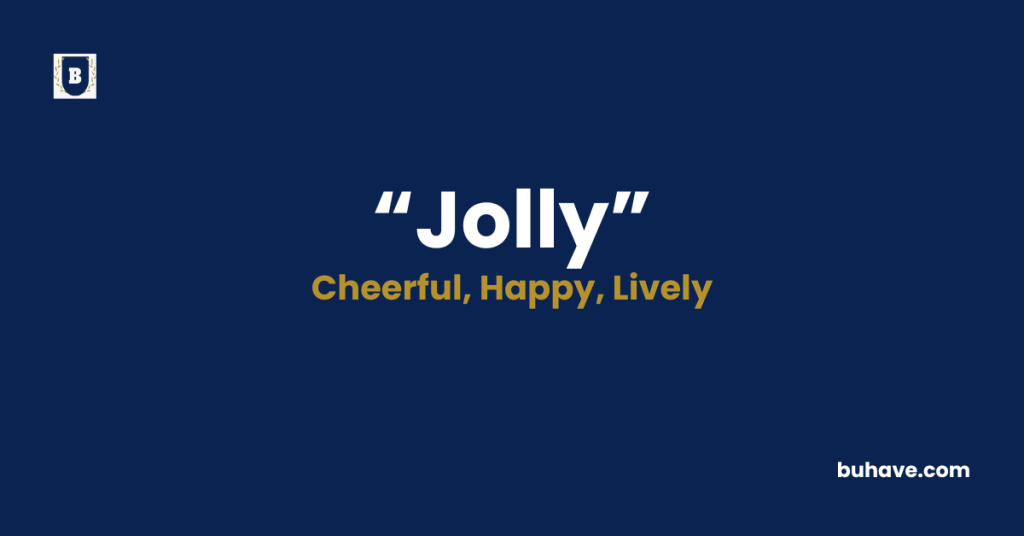The word ‘Jolly’ (Adjective) describes a cheerful, happy, and good-natured mood or attitude. At first, people used “jolly” to capture the feeling of hearty laughter, friendly smiles, and a lighthearted spirit. in this guide, you’ll learn the full definition, synonyms, antonyms, etymology, and real-life examples of how to use ‘Jolly’ correctly in sentences.
Jolly Explained in Depth
A complete and detailed guide to the words Jolly including meaning, definition, examples, etymology, synonyms, and antonyms.
Meanings of Jolly
Jolly means feeling or showing great happiness, cheerfulness, and good humor. At first, people often use “jolly” to describe someone who laughs easily, enjoys life, and spreads positive energy to everyone around them. In addition, the word captures a sense of lightheartedness and carefree fun, making it perfect for festive gatherings or joyful moments. Moreover, jolly people tend to uplift others through their warm smiles, friendly conversations, and playful spirit. Eventually, the word became common not only for describing people but also for describing events, atmospheres, and even music that feels lively and merry.
Today, when someone calls a person or a moment “jolly,” they celebrate the happiness, friendliness, and vibrant spirit that make life more joyful.
Definition:
Jolly describes a cheerful, happy, and good-natured mood or attitude. At first, people used “jolly” to capture the feeling of hearty laughter, friendly smiles, and a lighthearted spirit. In addition, it often reflects a sense of carefree joy that spreads easily to others. Moreover, a jolly person usually brightens the atmosphere, making conversations, celebrations, or even simple moments feel more lively and pleasant. Eventually,
it became a popular word not only for describing individuals but also for describing parties, songs, or events full of merriment. Today, when someone says something or someone is “jolly,” they highlight the genuine warmth, friendliness, and joyful energy that lifts everyone’s mood.
Etymology:
The word “jolly” has a cheerful and lively history. Originally, it came from the Old French word “jolif,” which meant “festive, merry, or pretty.” At first, “jolif” captured the spirit of joy, beauty, and youthful liveliness, which people celebrated in medieval French society. In addition, the French “jolif” likely traced its roots to earlier Germanic languages, although the exact origin remains a little unclear. Moreover, when English speakers adopted the word around the 14th century, they slightly shifted its meaning. It moved from simply meaning “pretty” or “festive” to emphasizing a deeper sense of hearty good humor and lively cheerfulness.
Eventually, “jolly” became firmly attached to describing people, parties, and even seasons that spark feelings of warmth, happiness, and celebration. Today, when people use “jolly,” they carry forward a long tradition of connecting beauty, joy, and vibrant life.
Example Sentence:
- First, the children looked jolly as they danced around the Christmas tree, laughing and singing.
- Moreover, the host welcomed every guest with a jolly smile that instantly made the party feel warm and inviting.
- Meanwhile, the streets filled with jolly music, and everyone joined the celebration with cheerful hearts.
- In addition, her jolly attitude lifted everyone’s spirits during the long and tiring trip.
- Finally, after sharing stories by the fire, the group ended their night on a jolly and unforgettable note.
Jolly Synonyms:
Jolly Antonyms:
- Sad
- Gloomy
- Miserable
- Depressed
- Somber
- Sorrowful
- Unhappy
- Melancholy
- Mournful
- Downcast
FAQs about Jolly
Here’s a FAQ-style guide about the word “Jolly”
1. What does “jolly” mean?
Jolly” is an adjective (and sometimes an adverb or verb) that typically means cheerful, happy, or full of good humor. It can also imply something lively, festive, or good-natured.
2. How is “jolly” used in a sentence?
- Adjective: “She had a jolly laugh that filled the room.”
- Adverb (British usage): “That’s jolly good news!”
- Verb: “He tried to jolly her along when she was feeling down.”
3. Is “jolly” formal or informal?
Jolly” is generally informal, cheerful, and often slightly old-fashioned or British in tone, though it’s still widely understood and used for its warm connotations.
4. What are synonyms for “jolly”?
- Cheerful
- Happy
- Merry
- Joyful
- Jovial
- Festive
5. What is the origin of “jolly”?
“Jolly” comes from the Old French word jolif, meaning festive or merry. It’s been part of English since the Middle Ages and is often associated with holiday cheer, as in “jolly old St. Nicholas.”
6. How is “jolly” used in British English?
In British English, “jolly” is sometimes used as an intensifier or mild expletive, especially in older or playful speech:
- “That was jolly nice of you.”
- “It’s jolly cold today!”
7. Can “jolly” describe people and things?
Yes:
- People: “He’s a jolly fellow.”
- Things/Events: “It was a jolly party.”
- Atmospheres: “The room had a jolly, festive feel.”

















